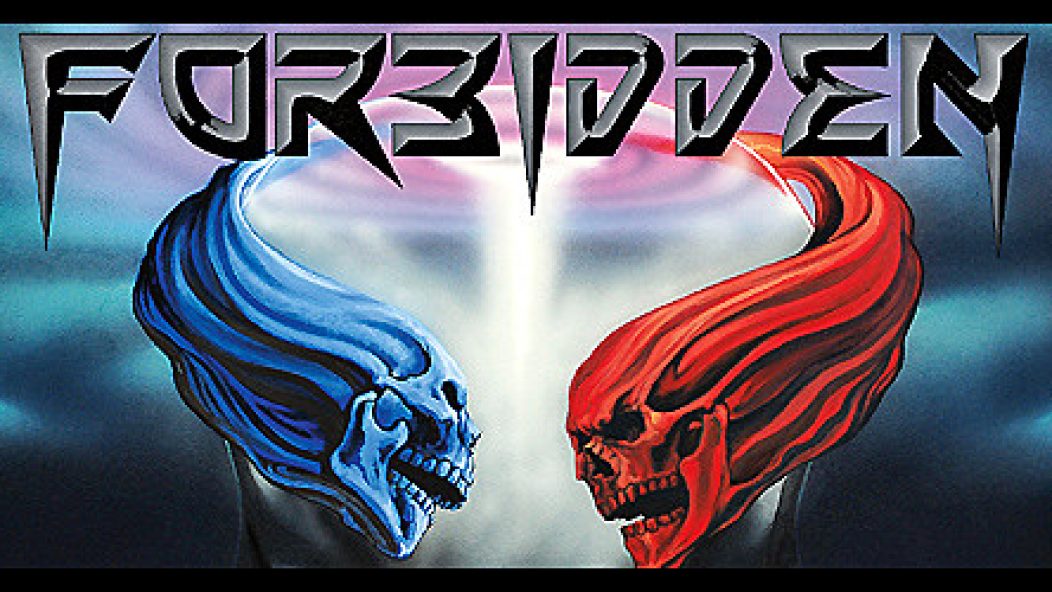
Interview: Forbidden
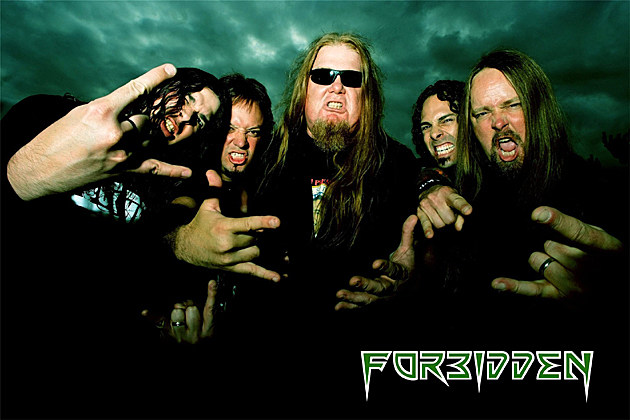
. . .
Last month’s Forbidden show at Los Angeles’ Whisky A Go-Go was one of the most emotional shows for me in a while. Most of the crowd was absurdly young – skinny thrash kids with crisp, new Slayer shirts. Presumably they were there for Forbidden’s openers: Evile, Bonded by Blood, Gama Bomb. But they stayed for Forbidden, a band whose heyday occurred before they were born. And not only did they stay, they also headbanged on the stage and sang along to the words. (Thank you, Internet.) Forbidden delivered a dream of a set showcasing old favorites and new classics from new album Omega Wave (Nuclear Blast, 2010). It’s not just one of the best thrash albums in recent years; it’s one of the best metal albums in recent years. Filled with rich, memorable songs, the record is a powerful statement about humanity’s imminent doom. Fire up “Dragging My Casket”, my favorite song from the album, and settle in for this chat with guitarists Craig Locicero and Steve Smyth and drummer Mark Hernandez. They touch upon, among other things, some points I made in yesterday’s post about songwriting.
. . .
“Dragging My Casket”
http://www.youtube.com/watch?v=yKoNkRNIm6Q
. . .
How’s the tour going?
CL: It’s going good. It started out really good with Overkill. Those dates were all just off the charts because it was their home area. They’re really big on the East Coast. We were lucky enough to be a part of that. Then we dropped off and did our own thing with the same bands. And it hasn’t gone as good, because we’re just building back up. But most of the dates have been really good. Places like Chicago were amazing. Places like Detroit were not. It’s very economy-driven. Wherever there’s a little bit of money seems to be where the better shows are at, as far as turnout [goes]. But the shows have been great.
How have you guys been playing?
MH: We’re actually getting a lot better. Where we started out a year ago, we were a totally different band. It’s only going to get better, for sure. And having these younger bands on the bill that are always spot-on every night has definitely raised the bar for us to go out there and do what we do even better.
What do each of you need to work on playing-wise on this tour?
MH: Pacing myself, man. For me, this is such a violent effort every night. It’s what I rest up for all day – to just put it all out there and give every fiber of my being. So sometimes you tend to wear yourself out a little bit, night after night giving everything. I wake up with a stiff neck, with a sore chest, a mega-sore ass.
SS: I’d have to agree with practically everything Mark said. Obviously Mark’s a more physical player – he’s the drummer. But for me, I try to give as much of a physical show as I can. That’s something I’ve built my own reputation on. Every fiber of your being when you’re out there is not yours – it’s theirs. That’s my mindset all the time.
So I would say endurance. It’s a big thing for me because this is my first real tour coming out of this health situation. (In 2006, Smyth received a kidney transplant due to chronic kidney disease.) And it’s by no means ever over. I just maintain it, that’s all it is. It’s the endurance thing and delivering in my mind that best show every single night so they get that, the people out there that drive forever to come and see us. We had people come in eight to 10 hours in Canada. There’s multiple shows like that. I was like, “Wow”.
CL: It’s funny, stamina just keeps popping up. That’s something I’ve actually been getting better at – pacing myself to not wear out too quickly. Some shows it goes better than others. Starting strong, too, would be something I need to get good at. Sometimes I’m just not as warmed up as I should be when I start. Also, really connecting to the song. I’m always thinking about what it means lyrically. You’ll see me singing a lot of it with the crowd. I’m very direct like that. I’m connected to it.
That’s what Steve Harris does.
CL: I’m a little Steve Harris-y without the bass. I’m intertwined in that end of it. And Russ [Anderson, vocalist] is really connecting this time with the crowds. I love watching him relay these stories and these situations. He’s better than he’s ever been on that level.
It’s all getting better, man. We’ve been watching these videos [of ourselves]. A few of the shows, you can see how much better we are than we were a couple years ago when we first started and we weren’t ready, and we were just trying. And now we’re doing. We’re not just trying, we’re actually doing. And then we’ll be better than that a year from now.
. . .
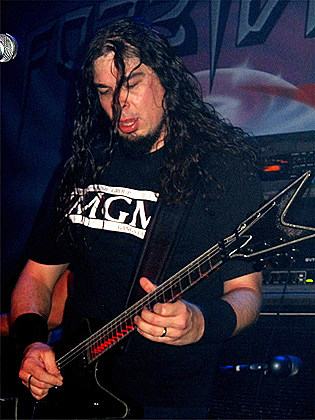
. . .
How has it been seeing young bands do what you did 20 years ago?
CL: They are, and they aren’t. There’s a definite connection, and there’s a little bit of a disconnection. It’s not that big. It’s just a generational thing. They got the spirit of it, but it’s kind of hard to really get the motivation of where we came from, because times are so different. But thrash is re-occurring because society is unhinging again.
It’s really great to see them fired up and playing. It’s just [that] a different set of circumstances made them than made us. We had Reagan, nuclear war, God, the devil. What else was there? There was nothing. Nowadays, you have all of this (makes sweeping gesture). That’s really the way we looked at it. There wasn’t much going on, man. We were still living off that fear, the [model] of good and evil. It was very simplistic. Nowadays… these kids in Bonded by Blood are very book-smart, very intelligent kids. You start learning where they’re coming from, and they have so much to pull from. It’s just a little different. They come from a different background. There’s way more information. It’s like the same but different.
MH: The influences are different. These bands are influenced by bands like us and Testament and the rest of the Bay Area guys. Whereas I think you even said, Craig, that you were influenced by Michael Schenker.
CL: Schenker, Beatles, Zeppelin – [the younger bands] may have missed that whole boat, so their pop sensibilities don’t work quite the same as ours. When you say pop sensibilities, that sounds kind of gay, but no – that means songwriting. We had songs to pull from – Van Halen and [so on]. Some of them might listen to that. But the majority of the new thrash bands listen to thrash or Maiden or Priest. That’s really [it]. But these kids, especially Evile and Bonded by Blood, are really trying to attain something. Gama Bomb’s cool as shit, but they’re more like D.R.I. – “Acid Rain”…
SS: Punk influences happening there, definitely. I played in Testament for about half a decade, and definitely on Eric Peterson, a huge influence was the whole early punk movement. The Dickies were huge with him. GBH was another big one as well. Craig – The Exploited?
CL: I liked all that – The Exploited, Raw Power. I totally got into that whole thing. Forbidden’s first real fans were a bunch of punk kids I knew that came to our shows and started the pits. They were the hardcore punks. You’ve still got some of that [now], but it’s just a different set [of influences].
You try to mimic something, but you can’t really mimic [it], because you can’t replace the time. So now it’s their own thing. I’m waiting for the band to break off out of this new genre, the new re-emergence of [thrash], that actually figures out that they need to go a little further and try to do something special with it, instead of being like bands like us and Testament and Exodus and Death Angel and Sodom and Kreator. There’s more than that. There’s something special waiting to bubble up in one of these bands that’s going to blow everyone’s mind. I’m waiting for it. I haven’t heard it yet. It’s all good stuff, but nothing’s like, “BOOM! This is it!”
. . .
I was just listening your new record before this. You guys were out of the game for a while, but already you guys are ahead of the pack. The songwriting’s a lot more advanced.
CL: Our set of influences that we pull from is so vast. With Forbidden, you had a band that was all over the map, and that chaos was Forbidden Evil. We didn’t really know what we were trying to do. It was fast, this guy is singing (makes high falsetto voice) everywhere, what’s going on? I listen to that album now, and I’m like, “Fuck, I’ve got to grab onto something because it’s fucking chaos”. But there’s something very melodic to grab onto. And with this album – Mark and I said it all the time, and it became everyone’s slogan: “Surrender to the metal”. Just let it be metal. And let it be itself. Let it breathe, let it find its own way.
That phrase “Surrender to the metal” is funny, since it seems like for a decade, you resisted the metal. (During Forbidden’s hiatus from 1997 to 2007, Locicero played in non-metal rock bands.)
CL: Oh, yeah, if you know my history. It’s not that I resisted the metal. I just didn’t like very much metal. I would go see bands that I liked a lot. I would go see Strapping Young Lad – great friends of mine. I’ll be honest with you, man, it just wasn’t working for me. I didn’t resist it. What brought me back in was partially the Get Thrashed movie and partially the situation in the world, having something to write about that I was motivated [about].
Anger has to be in my core, because some of this stuff towards Forbidden’s center [discography-wise] was a little disjointed. We were like, “What are we actually writing about?” I started getting into the conspiracy stuff a lot in Green and Distortion, but I was flying a solo flag there. No one else in the band was really into it. And this time, Russ and I did lots of research, and we talked about shit. Everybody was talking about it at practice. We got our resident cynic in Matt [Camacho, bassist], who doesn’t believe anything’s wrong. He’ll come in and say, “Nah, everything’s fine. The economy will never crash!” It’s a great balance that we have now.
SS: And I live out of the country now, so I definitely lend a different perspective on things.
CL: Him living in London is actually a great sounding board for what is wrong with our country. He really just puts it in a nutshell.
. . .
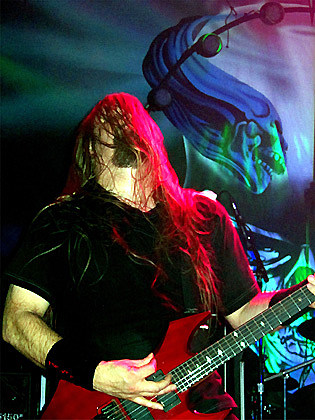
. . .
Steve, you were in London to get medical care?
SS: No, no. It was completely the opposite. I had moved there and had no idea I had anything wrong [with me]. It was actually there, right after a European headlining tour with Nevermore, who I was with at the time, I sprained my right knee really badly, to the point where I needed arthroscopic surgery to actually find out if I’d torn my meniscus or not. They did a blood test. They found a certain blood level to be off the charts. I had to leave there and come back here to get medical care.
How would you compare playing in Forbidden to playing in your previous bands – Testament, Nevermore?
SS: It’s a different thing, you know. With Testament, it’s a genre type of thing, so guitar-specific types of things are going to happen. But every guitar player that I’ve played with is different. One unique thing was having the experience of playing in Nevermore and then coming into this some years later, because Jeff [Loomis, Nevermore guitarist] took a lot of influence from Tim Calvert, who was also in Nevermore. Tim, in turn, played with Craig. (Calvert was in Forbidden from 1989 to 1997.) And Craig’s got a unique couple things that he does. Not even just a couple – there’s quite a few things.
What are some of these things?
SS: Economy picking types of things. A lot of weird, off-beat, up-pick things as well. The focus of the up-pick in terms of raking, arpeggiating, and things like that is ever-present, especially in the older Nevermore material, especially Dead Heart in a Dead World. Jeff started doing that a lot there, and that’s actually right after Tim had left the band. And Dreaming Neon Black – there’s a lot of happening there.
Immolation played here recently. If you’ve ever seen Bob Vigna play, it’s a lot of up-picking.
SS: (Does spot-on Vigna up-pick impression)
CL: For me, it’s like a scratch. It’s a more violent way of getting the note. You get more emotion out of it. You’re tearing something.
Does Forbidden ever do the football type of huddle where you get together and say, “We are Forbidden, this is what we do”?
CL: I’ve once in a while tried those motivational fucking moments. You don’t really need to say it, because everyone’s kind of got this awareness.
SS: “You guys are sucking, man, you’ve got to pick it up. You’ve got to pick up the slack, man”.
CL: Well, there’s been that.
MH: “I’m tired of carrying you guys. I’m tired!” (Laughter all around)
CL: Matt carries us all the time, our bass player.
MH: Every night when that intro tape rolls, we just know it and feel it. We put our fists out, and it’s there. Without saying it so much, that’s the huddle. “It’s go-time, this is why we’re here”.
SS: It’s like everything [is] out the window – you’re in [the zone].
CL: This is an honor to be doing this, to be quite honest with you, to have people actually interested again. I think music in general is a gift, and if you get a really big head over being able to do it, then you’re missing the point that you’re just a better radio receiver than the other people.
. . .
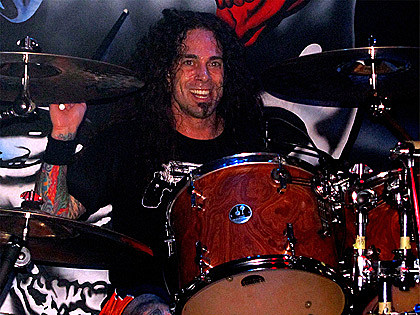
. . .
Since you guys are veterans, you probably have peers who fell off along the way and became normal people with jobs and houses and families. What’s kept you on this path?
SS: For me, personally, it took a lot to actually come here. I came back from a serious health situation, something that basically could have gone the other way very, very easily and very, very quickly. And I don’t take that for granted at all. There’s that aspect. The motivation and desire to even play metal anymore had to be there as well. It was a big, big thing for me. I actually still do have a career as well, a teaching career. I teach in a music college. You put on a hat here, a hat there. But this is not really a hat, man. This is something that’s very much in my blood, and I care a lot about it.
MH: Definitely.
CL: It’s a lifestyle for all of us.
MH: I don’t know, I could be getting divorce when I go home, who knows? (Laughter all around)
You wouldn’t be the first musician to do so.
MH: It just is, you know. Like Craig said, going back to writing music and having to be angry – I was married, got two kids, got a great job. What was there to be angry about? Really nothing. My life was great. Nothing to be angry about. But the state of the world…
CL: You’ve got to look outside your situation.
MH: You get outside your bubble, and there’s a lot of shit to be upset about.
CL: You want your family to do well! Sorry to interrupt.
MH: No, no, we’re on the same wavelength with that. You either do it, or you don’t. You’re a lifer, or you’re not. And I have a lot of friends that don’t do it anymore. I’m not better, I’m not worse; this is the path I’ve chosen, you know. And so until my dick hair’s gray, I’ll do it.
CL: For me, personally, I’ve been through so much different stuff. I really skimmed through the end of Forbidden. I was very lucky to even make it out of that whole thing alive. Then I obviously started doing a different thing. There’s one point where I had a lot of fucking money thrown at me. I lived off that for a while. And I was kind of miserable, because others weren’t as dedicated to the craft of music as I was. There’s being a lifer, and then there’s being somebody that expects everything given to you. So I don’t expect anything to be given to me anymore. I kind of expect nothing all the time. So when I get something, I’m like, “Killer!”
. . .
Steve, since Forbidden has political overtones, and you’re an expatriate now, has that given you insight into the band that you wouldn’t have otherwise?
SS: In terms of the subject matter and what we’re talking about, there’s a lot of stuff that you see when you’re on the other side of the world that these guys don’t really see. There’s programmed media in every country that you can possibly live in on this earth. You start seeing it. I see it, honestly, the more I come back here. I’m starting to see very much that there’s a left, there’s a right, there’s a purported middle ground. But that middle ground doesn’t really speak for anybody. And they all speak to the same thing – the almighty dollar. That dollar is actually having a lot of problems around the world right now. And I see a lot of that happening. You get to see the falseness of what’s actually happening within what you’re being told. You have to basically read between the lines to really understand what it is that you’re seeing and hearing, because there’s just so much fucking bullshit out there, distorted truths.
CL: The whole idea of left and right is one of the biggest swindles and illusions that we’ve ever [undergone]. It’s like it’s giving you the narrowest of choices. You could never even imagine when media started that people would become so daft. “Sheeple” – the first time I heard it, I couldn’t believe I didn’t hear that one before. That’s perfect, “sheeple”! You’re living in a time where people think they know it all, but they’re aren’t doing shit about it. The collective consciousness has no balls.
SS: If I could add to that – yes, I’m an expat, but don’t get me wrong, man, I love this country. I just don’t love the government. I love the people, absolutely.
But the people elected the government.
SS: Well, did they?
MH: There’s another whole another argument.
CL: You’ve gotta give it up to South Park. We’re going to vote for a douche or a shit sandwich. And these are what you’re given. You don’t make it to that level of politics without having compromised and sold your fucking soul down the river a long time ago. You’ve made enough backroom deals, and you’re special interest-owned by now. You say you’re not, but it’s just rhetoric.
It seems to be the human way right now just to fall into line like this. It’s a crying fucking shame, but this is the planet we’ve created for ourselves. And unless the collective consciousness snaps its head out all at once, and something makes people realize that you have to abolish all corporations to begin with… and then you’re starting to talk about socialism, which is a programmed dirty word. There’s got to be something people adhere to that makes sense on a universal level. And that will never fucking happen as long as you’re just being fed two sides of bullshit. That’s really my point. So that’s what this album’s about.
. . .
“Overthrow”
http://www.youtube.com/watch?v=GmmEjUkH3MA
. . .
Much of Forbidden’s music, and metal in general, is phrased as a complaint.
CL: Not much of a solution [there].
What does it offer that makes things better?
CL: Well, it’s not just a complaint. It’s more or less somewhat of an alarm clock. The alarm clock hits hard especially in “Overthrow”, when Russ hits that high note and the guitars are shooting from side to side. There’s a state of being and consciousness that needs to be accepted. We aren’t really preaching, but you have to say “fuck you” to this thing.
And people are afraid to do what they did in China because they got ran over in the streets. They got fucking crushed. And that’s what you’re dealing with right now. You’re dealing with a system that we put in place, out of just being docile. And people are so afraid to stand up because they feel it’s just overwhelming, and that is the Omega Wave, that overwhelming feeling right there.
Listen, man. I don’t know what’s really going to snap people’s heads out of this. But it’s something that we haven’t seen yet. It’s not a person, it’s not a fucking place. It might be an event. It might be anything like that. But it’s got to be something so massive that people either get it or they don’t. Or just forget it, the Omega Wave will fucking crush you. It’s in motion. You can see it. That’s kind of where we are now.
I want to make a change. I’d rather be a part of the solution than a part of the problem. I want my son to have a chance. But you’ve got to at least accept the reality that things are so fucked up right now. So [we’re] complaining, yeah, more or less, but also just out-and-out screaming in anger about it. You’ve gotta take that stance, and then get people to the next level of massive changes. But you can’t do it all at once. First you have to start with a slap in the face.
On tour, do you have conversations like this with fans?
CL: I have conversations like this. It’s weird, because they’re not as few and far between as you may think. People at the end of the night, when we’re standing by the merchandise – [they’ll say] “Dude, the lyrics really [mean something to me]”. Really since Twisted into Form, it’s been happening. But this [album], it’s been hitting home. I’ve done a lot of interviews like this. In Japan, they’re asking all about the politics – or anti-politics in our case. Fuck politics, because politics is what got us here. And long as you’re volleying and serving the way that things are, nothing will change. People have been keying in on it, yes.
. . .
HEAR OMEGA WAVE
. . .
BUY OMEGA WAVE
Amazon (CD)
Amazon (MP3)
Nuclear Blast (CD, 2LP)
. . .











